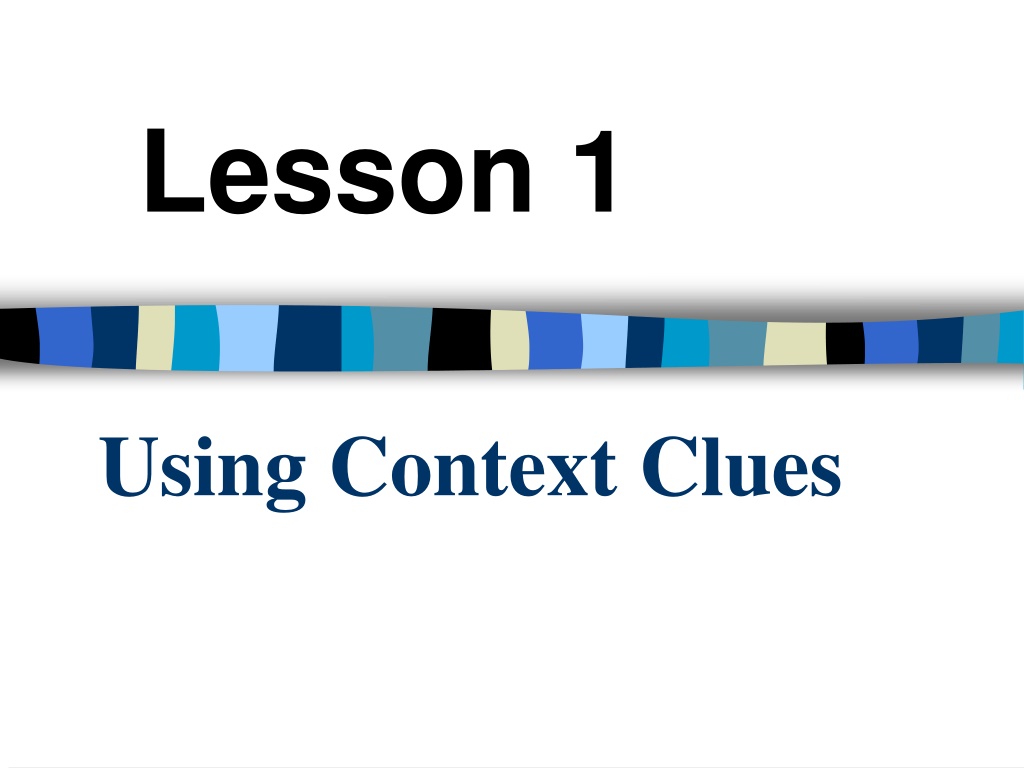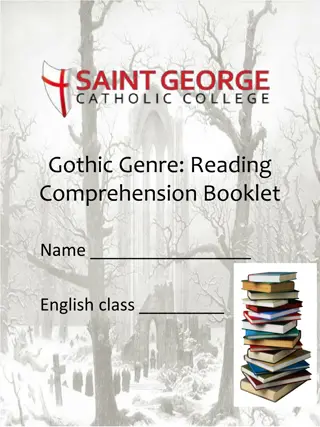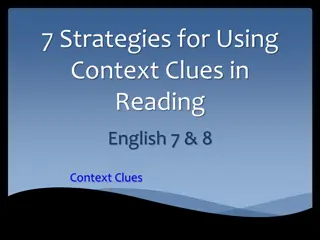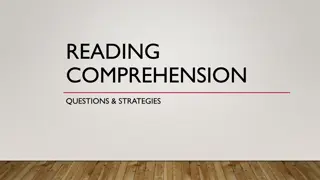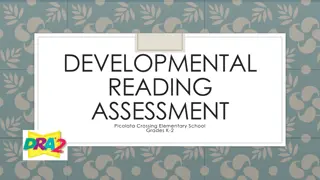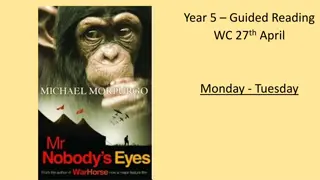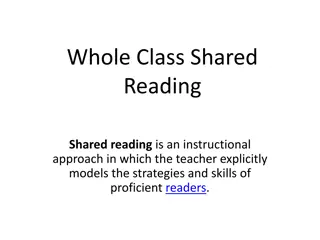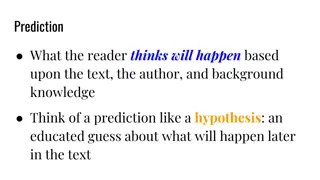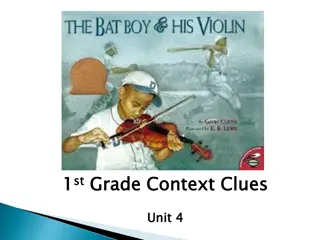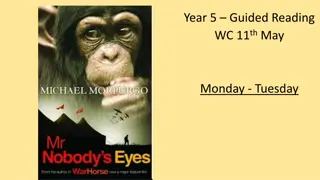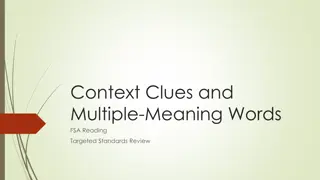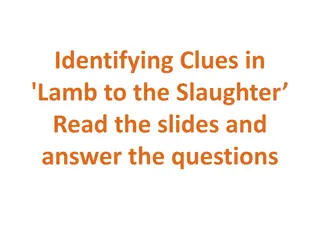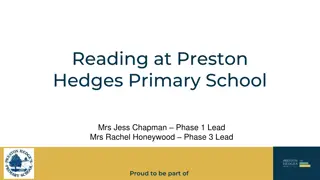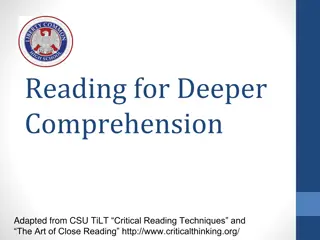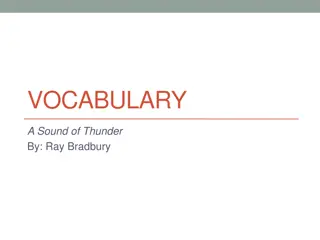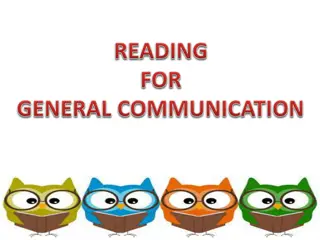Understanding Context Clues for Effective Reading Comprehension
Learn how to utilize context clues to decipher the meanings of unfamiliar words in text. Explore different types of context clues such as definitions, examples, comparisons, contrasts, and cause and effect relationships. Enhance your reading comprehension skills by acting as a detective to unravel the meanings of unknown words within a story or article.
Download Presentation

Please find below an Image/Link to download the presentation.
The content on the website is provided AS IS for your information and personal use only. It may not be sold, licensed, or shared on other websites without obtaining consent from the author. Download presentation by click this link. If you encounter any issues during the download, it is possible that the publisher has removed the file from their server.
E N D
Presentation Transcript
Lesson 1 Using Context Clues
Zach was a mediocre basketball player. This sentence is no help to you in figuring out what mediocre means because it provides no useful context clues.
Context clues are bits of information from the text that, when combined with prior knowledge, allow you to decide the meaning of unknown words in the story or article you are reading. As a reader you must act similar to a detective and put together clues from sentences surrounding an unknown word in order to make an intelligent guess as to what the definition of a word is
Click on the link below to watch a video clip. Pay careful attention to what the song tells you. When the video is over click the back arrow in the upper left hand corner. http://www.youtube.com/watch?v=qgaS mJKR9HM
Definition: Metrology, or the science of weather forecasting, has become Todd s favorite subject. The meaning of the unfamiliar word is stated in the sentence.
Example: Fran loves to study mammals such as kangaroos. The meaning of the unfamiliar word is explained through one familiar case.
Comparison: Dissension closely resembles disagreement. The unfamiliar word is similar to a familiar word or phrase.
Contrast: Unlike his despondent opponent, kwami appeared hopeful, happy and sure he would win. The unfamiliar word is the opposite of a familiar word or phrase.
Cause and effect: Maria felt the stranger was being intrusive because he asked too many personal questions. The unfamiliar word describes a cause in a sentence in which the effect is understood.
Some words that can be used as clues: Comparison: Also, same, likewise, similar, similarly, identical & identically. Contrast: But, on the other hand, on the contrary, unlike & however. Cause and effect: Because, since, therefore, as a result & consequently.
Your friend Ryan has moved to a new country and is learning a new language. Read what he wrote in his diary and see if you can figure out the meaning to the underlined words. Dear Diary, I overslept this morning. I had to eat my bowl of poof-poofs very quickly, and I almost missed the tramzam. When I got to school, I realized I had forgotten my zilgping . Luckily, Ms. Jutzi is very zoosh, and told me I could bring it tomorrow. After school, some friends and I played plingming. It s a new game I am learning. We scored 7 points and they only scored 5 points, so we were the zoiters! Dad says that next weekend we re going to the fladder . I can t wait! I love to swim and play in the sand. I hope I don t get a sunburn though. Well, I better go to bed soon. I don t want to wake up late again and miss my tramzam! Until tomorrow, Ryan
Its time for some detective work. Take each word from Ryan s diary that is written in his new language and use the context clues in the text to figure them out!
What could the word poof-poofs mean? The sentences tell me it is something that can be eaten. I know that it is a breakfast food because Ryan said it was morning. I also know that it goes in a bowl. What do you think it is? The most logical guess would be a type of cereal. What could the word tramzam mean? The sentences tell me that Ryan was going to school and he almost missed his tramzam. What do you think it is? The most logical guess would be a school bus.
What could the word plingming mean? The sentences tell me it is a game Ryan and his friends play against each other and that points can be scored. What do you think it is? The most logical guess would be a sport such as basketball or soccer. What could the word zoiters mean? The sentences tell me that Ryan s team scored 7 points while the other team scored less points. What do you think it is? The most logical guess would be that it means winners.
What could the word fladder mean? The sentences tell me that Ryan s dad said he could go there and when he gets there they will swim and play in the sand. Ryan also mentions not wanting a sunburn. What do you think it is? The most logical guess would be a lake or a beach. And, remember, we already figured out the word tramzam probably means school bus.
How you react when faced with physical or emotional danger can often mean the difference between life and death. The words in this lesson relate to matters of life and death.
1- Commemorate (v.) To honor the memory of with a ceremony, to serve as a memorial; to call to remembrance. Ex: The monument commemorates the signing of the Declaration of Independence. Commemorator, noun Synonym: to keep, memorialize
2- Eulogy (n) A formal speech that praises someone Pl: Eulogies This Saturday, I have been asked to deliver the eulogy at my grandma s memorial. eulogistic adj., eulogistically adv. Synonym: Praise, acclamation
3- Quarry (n.) One that is pursued; pray The police lost their quarry in the crowd.
4- Vital (adj.) Necessary to maintain life Ex: A vital component of any democracy is a free labor movement" (Bayard Rustin) Vitally, adverb Synonyms: important, critical.
5- Sustenance (n.) Something that sustains life; food nourishment , means of livelihood They were in want of sustenance.
6- Dire (adj.) Warning of disaster Ex: Have you heard the dire predictions about the stock market? Related forms: direly, adverb
7- Immortality (n.) the quality of being exempt from death; unending existence Ex: The Wright brothers achieved immortality with the first powered flight in 1903. Related forms: immortally, adverb immortal, adj synonym: deathlessness
8- Epitaph (n.) an inscription at a grave site in memory of the person buried there. October 25, 1400, was the date of Chaucer's own death, according to the epitaph inscribed on his sixteenth- century tomb.
9- Predator (n.) any organism that exists by preying on another organism Ex: The owl is a predator which kills its prey with its claws.
10- Longevity (n.) Long duration of life Ex: His longevity vexed his heirs. Ex: Our family is known for its longevity. Synonyms: survival, old age
